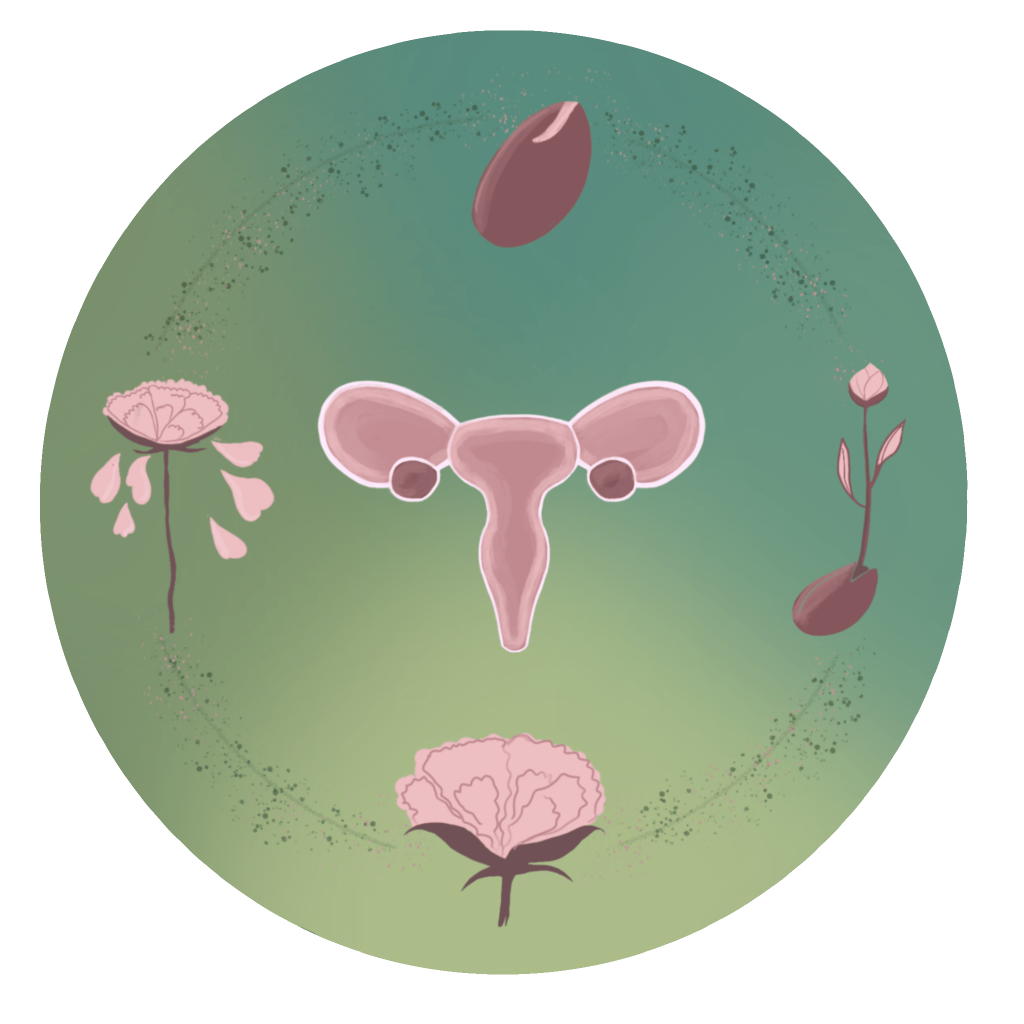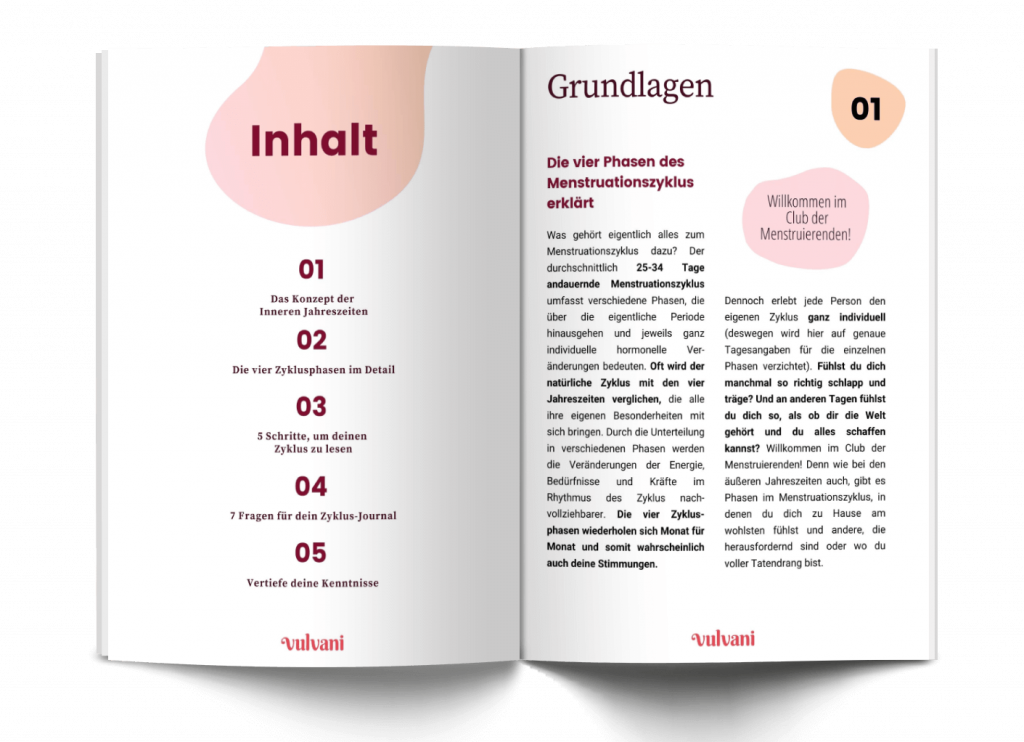
Discovering your menstruation as a spiritual practice
Yasmine understands her menstruation as a spiritual practice and shares in this interview how she is connecting more with her own body through cycle awareness.
Menstruation is dismissed by many as an inconvenience, although it could be read as a monthly health check. Would you like to learn more about the four phases of your menstrual cycle and how they can affect your mood?
Let’s start off easy with a little revision lesson. We know menstruation. Check. We also know ovulation, at least as a time when pregnancy is possible. But then it probably stops already, doesn’t it? One of the most common misconceptions about our period is that our cycle only takes place when we bleed. The menstrual cycle, which lasts an average of 28 days, in fact includes various phases that go beyond the actual period and bring about hormonal changes. The natural cycle is often compared with the four seasons: winter, spring, summer and autumn.
The menstrual cycle has a direct influence on how we feel. The subdivision into different phases makes the changes for energy and mood more comprehensible. Nevertheless, each menstruating person experiences their own cycle individually. Do you sometimes feel really tired and lazy? And on other days you feel as if the world belongs to you and you can do anything? Welcome to the club of menstruators!
Are you someone who loves their cycle or are you more like: ‘Who needs menstruation?’ No matter how you feel about periods, a little more knowledge is always good. A deeper understanding of your individual cycle can help you to better understand your own well-being and feelings. Because the four phases of the cycle repeat themselves month by month and thus with them probably also your mood changes. If possible, it can even make sense to plan your activities according to the different cycle phases. Sounds crazy, doesn’t it?
The first day of your monthly bleeding is the beginning of your menstruation and a new cycle. The first phase is actually called ‘menstruation’. If we had to describe the menstrual phase, there would probably be terms like low energy, rest or being at home. It’s like winter, a rather quiet, slow time to reflect. Menstruation is ideal for relaxing, planning and making decisions. However, if you suffer from menstrual pain, you may want to postpone planning to the luteal phase (phase 4) and rest well now. Menstruation usually lasts between three and seven days.
The follicular phase brings with it more energy, focus and self-confidence due to a rising estrogen level. Spring fever awakens. You are full of energy and feel free and at ease. This phase is perfect for being productive and successfully mastering challenges. Sounds good, doesn’t it? And it gets even better: This energetic phase is the longest in your cycle! Because it overlaps with the last days of the first menstrual phase.
When we ovulate, more energy and creativity is released as hormone levels continue to rise. This gives you the warm and summery feeling that you can do anything. The time of ovulation is a power phase and the best time to invest in personal relationships and to be active. Ovulation is usually right in the middle of a regular cycle. Some people can feel ovulation in the form of pain. The middle pain lasts only a few hours. This is also your fertile cycle phase and the chances of getting pregnant are high!
In the last phase, the hormone progesterone dominates the cycle. You may feel a little more sensitive during this time, want to pull back and are thinking a lot. But be compassionate with yourself, because self-criticism can be on the agenda as well now. Many people associate this phase with premenstrual syndrome, also known as PMS. The symptoms often start four to seven days before the start of your next menstruation. The luteal phase and thus the cycle end on the last day before the onset of your next menstrual period. With menstruation, the cycle starts all over again.
Are you ready to finally understand your body & your mood swings better and learn cycle awareness? Then our online course “Cycle Awareness as a Superpower” is perfect for you!

Your mood changes probably repeat themselves month by month, without you having noticed any regularity so far? Then it’s time for you to become more aware of your cycle and write down some key information, such as day of your cycle, mood and energy level. You can do this the old-fashioned way on paper or use one of the many menstrual tracking apps. You might wonder why you should follow your cycle conciously? Over time, you will probably recognize a pattern in your cycles and know how you will feel in the different phases. Then you can think about when your next lazy or productive phase awaits you. If you know your cycle, you can understand your own mood changes more easily and understand your energy fluctuations better. Living in sync with your cycle and anticipating how you will feel in the next few weeks sounds pretty tempting, doesn’t it?
Note: If you use hormonal contraception (e.g. the pill, spiral or NuvaRing), your cycle will be intentionally changed. Hormones suppress your ovulation to prevent the possibility of pregnancy. Accordingly, your cycle phases will also feel different and the descriptions in this text probably do not apply to you.



Yasmine understands her menstruation as a spiritual practice and shares in this interview how she is connecting more with her own body through cycle awareness.

What options are there for male birth control? Ailsa delivers an overview of what is available now, and what may come in the future.

Sustainable underwear? The founders of TUKEA talk about fair labour conditions, body diversity and body literacy.
…and empower countless women to make empowered choices about their bodies!


0 Comments.
Awesome post.